The Governors of Michigan: Introduction
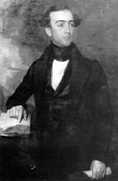
Photograph of a portrait
of Stevens T. Mason,
first governor of
the state of Michigan.
Original in director's
office, Bentley Historical
Library
The Bentley Historical Library, a research library of the University of Michigan, houses an extensive collection of manuscripts, visual materials, books, and other media relating to the history of Michigan from its earliest days to the present. The library also serves as the archives for the University of Michigan. Founded in 1935 as the Michigan Historical Collections (now a formal division within the library), the Bentley Historical Library has evolved into one of the state's premier archival repositories with historical materials covering virtually every facet of state history.
Politics is one of the principal collecting strengths of the library. The records of political parties and special interest groups and the papers of many public officials come together at the Bentley Library to provide researchers with one of the most comprehensive political collections among the fifty states. At the heart of these holdings are the papers of 35 governors of Michigan. These gubernatorial collections provide insight into the lives of those individuals who have served as the state's highest executive officer from Stevens T. Mason, who was elected its first governor in 1835, through Jennifer Granholm, the forty-seventh governor, who left office in 2011.
These collections of gubernatorial materials have been painstakingly assembled by archivists at the library over a period of sixty years. When the library was established in 1935, there were no other Michigan repositories with an interest in, or statutory responsibility for, the personal papers of Michigan's governors.
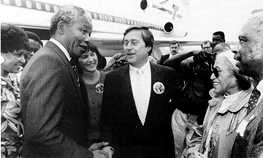
Governor James Blanchard greets Nelson
Mandela on his visit to Detroit in
1990.
Photograph by David C. Turnley, ©The Detroit
Free
Press, used with permission. James
Blanchard papers. Bentley Historical
Library.
Sadly, with no repository available to accept them, the papers were either dispersed into private hands or, in some cases, discarded.
In this period, of course, the amount of paper generated by a Mason in the mid-19th century or a Woodbridge Ferris in the early 20th was nowhere comparable to that emanating from the governor's office in the post-World War II era (from G. Mennen Williams on).
Before World War II, the office of governor was much smaller than today and usually managed by a handful of people. The office was very much the extension of an individual with the assistance of a few staff and aides. In the early, less bureaucratic period of government, up to the mid-1930s, there was no question that the papers of the governor, much smaller in quantity, were personal and as such could be discarded or taken home as the governor thought best.
The history of how the Bentley Library acquired the papers of governors who served prior to G. Mennen Williams illustrates the varied and often long and involved process by which these materials came to the University of Michigan. Modern governors, under pressure to clear out their offices at the end of their terms, have sought out the Bentley Library to be the custodians of their papers. Prior to this, governors like Chase S. Osborn, having created much less material, frequently took what files they wanted home with them. In these instances, rather than a governor seeking an appropriate archive for his papers, the archive found itself in the position of tracking down surviving documents from the governor or more likely his heirs. The acquisition of these materials was time-consuming and frequently frustrating, but in the long run, richly rewarding as numerous researchers of these papers can already attest. Below are three examples suggesting the effort, labor, and sometimes luck involved in assembling the library's gubernatorial holdings. The stories behind the acquisition of the Alpheus Felch, Chase Osborn and Frank Murphy papers are both interesting and illustrative.
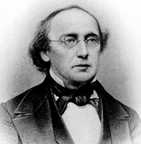
Engraving of Alpheus Felch.
Alpheus Felch papers,
Bentley
Historical Library.
The papers of nineteenth century governor Alpheus Felch remained in private hands for over 130 years. Soon after the establishment of the Michigan Historical Collections, director Lewis G. Vander Velde wrote to one of Felch's granddaughters soliciting the papers for his newly founded library. The collection would have been a natural because Felch was also a University of Michigan regent, and university history was one of the library's primary collecting themes. No response was received from the family then, and twelve years later a gentle letter was sent out reminding the family of the library's continued interest in the papers. Some materials were received in 1949, but the rest remained with the donor, who was desirous of writing a biography of her illustrious grandfather. Though the biography was never written she insisted on holding onto the papers.
This is not an uncommon example; individuals often retain papers hoping to use them in the writing of their memoirs or biographies. Thirty years passed with little communication, and then in 1981, the library received a phone call from the executor of the estate of Felch's great-granddaughter! He had stumbled onto the letters of Lewis Vander Velde in a trunk containing the Felch papers. Were we still interested in the papers? The answer was obvious, and within weeks, the library was the recipient of hundreds of letters of Felch, the governor of Michigan, 1846-1847, and later a United States Senator, 1847-1853.
The passage of 130 years before receiving a collection is not typical. More commonly, we contact prospective donors while they are still in the public eye, and urge those individuals to consider the Michigan Historical Collections when the time comes to make disposition of their papers.
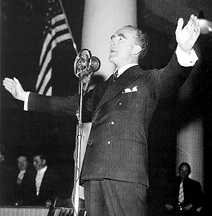
Frank Murphy delivering a speech as
governor, c. 1936.
Frank Murphy papers,
Bentley Historical Library.
When serving as U.S. attorney general in 1939, and after his service as governor of Michigan, Frank Murphy received a letter from Director Vander Velde asking the Michigan politician to establish a Frank Murphy collection. The Attorney General responded that "the Michigan Historical Collections are of great interest to me, and that I sympathize heartily with their purpose." The University of Michigan connection did not hurt either as Murphy was a 1914 graduate of the U-M Law School.
Many years would elapse, however, before the Murphy papers would finally come. Murphy died in 1949 and matters of his estate passed to his brother. George Murphy was willing to donate the papers but he wanted to examine them first. Communications were exchanged throughout the 1950s, then in 1961 and for several years thereafter, the papers began coming to the library.
Today, the Murphy collection is one of the Bentley Library's most heavily used collections, and the important source for the study of Frank Murphy's gubernatorial administration as well as his other public offices.
Chase S. Osborn also had ties to the University of Michigan serving as regent before becoming governor. Approached in 1937 about donating his papers, Osborn was at first non-committal, but over the next decade he began donating published materials, clippings, and copies of articles. With his death in 1949, and through the good work of his widow, Stella Osborn, the papers - "the largest collection of personal manuscripts which we have," assistant director F. Clever Bald wrote - arrived.
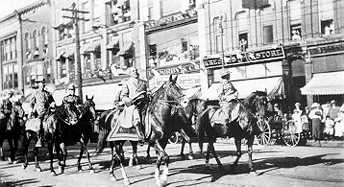
Chase
S. Osborn leading a parade, c. 1911. Chase S.
Osborn papers, Bentley
Historical Library.
These three examples are representative of how and why the Bentley Library is now the home of collections for 27 of Michigan's governors. Though there is not always a University of Michigan connection, the donors of these governors' collections, be they the individual himself or family members, have recognized the Bentley Library as an important and independent research center. In its more than seventy-five year history, the Michigan Historical Collections housed at the Bentley Historical Library has a proven record of excellence in the management of governors' papers. The collections are professionally arranged and described, housed under appropriate archival standards, and made available to students and researchers from throughout the state and the nation. And now through computer networks, researchers have on-line access to descriptions of the collections via the Internet through the University of Michigan's on-line catalog (MIRLYN) and through the international library and archival utility OCLC.
In 1960 when G. Mennen Williams ended six two-year terms of service as governor, he chose to have his papers shipped directly from the state capital to the Michigan Historical Collections (then housed in the Rackham Building of the University of Michigan). His donation began a new phase in the relationship between the library and the governors of the state. The work of the governor had expanded over the years and the papers of the governor represented his own efforts as well as that of a staff much larger than that of his predecessors. The question of what constituted the personal papers of the governors became rather complex. In 1960, the Attorney General of the state resolved this issue by ruling that the governors had wide latitude in determining what papers in the office were indeed personal. Governors Williams, Swainson, and Romney simply declared all their office papers personal and shipped them directly to Ann Arbor. Governor Milliken also retained the authority to make this determination, but chose to divide his papers, with those considered official public records going to the State Archives and those considered personal papers going to the Bentley Library. Governor Blanchard followed the model established by his predecessor in office.
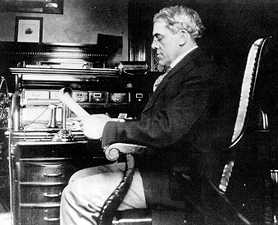
Chase S. Osborn in the governor' office, c. 1911.
Chase S. Osborn papers,
Bentley Historical Library.
During the years 1992-94, archivists at the Bentley Library and at the State Archives held a series of meetings to begin to develop guidelines for the definition of public records and personal papers in the holdings of governor. Appropriate legislation has been proposed to give some structure to an increasingly complex matter of definition.
The gubernatorial papers at the Bentley Historical Library have been the critical basis for a broad range of academic research, legislative analysis, and popular interest in the history of the state of Michigan. They are the source for award-winning biographical studies, including University of Michigan Professor Sidney Fine's three-volume study of Governor Frank Murphy. For scholarly research focused upon particular public issues, they provide crucial evidence of the state's deliberations over education, housing, abortion, transportation, the military, environmental issues, and civil rights. Doctoral students from around the country have turned to Michigan as a case study because of the exceptionally rich gubernatorial material available on such topics as environmentalism, the suffrage movement, and the urban crisis of the 1960s. Titles of their dissertations include "Cleaning Up the Great Lakes: Politics, Policy, and Water Pollution Control, 1960- 1978," "A History of Woman Suffrage in Michigan," and "The Origins of the Urban Underclass: Race, Industrial Decline, and Poverty in Detroit, 1940-1980."
The governors' papers collectively reinforce other premier collections of the Bentley Historical Library which address the state's political history. As such, they complement the records of the Democratic and Republican parties' state central committee records at the Bentley Historical Library. Together the gubernatorial papers and the parties' records have served as the basis for dissertation studies on the transformation of politics and public policy in the mid-twentieth century. They also provide a statewide context for local manuscripts, such as those collections at the library relating to President Gerald Ford's early political career in Grand Rapids.
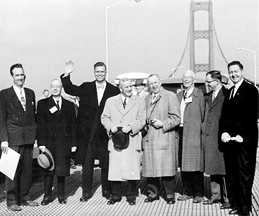
Governor G. Mennen Williams with other
dignitaries at the opening day ceremony
of the Mackinac Bridge, November,
1957.
G. Mennen Williams papers, Bentley Historical
Library.
Legislators, lobbyists, and the press have turned to the historical records of the governors to learn more about particular legislation, such as highway safety regulations, or even acts of pardon. Using analytical inventories of the contents of relevant collections, the reference staff of the library responds to all such requests for searches through the governors' papers for legislative analysis, speeches, press releases, and constituent opinion.
The general public, too, has found much of benefit in the governors' papers. They have read through the papers of Chase Osborn to satisfy their curiosities about progressive environmentalism in the Upper Peninsula in the early twentieth century, or they have imagined the drama of the building of the Mackinac Bridge by examining the original photographs of its construction.
The Bentley Library continues to seek out and welcome the personal papers of the governors of the state. We believe these collections will remain of fundamental importance to future generations of scholars and Michigan citizens, who will come to the University of Michigan and to this library to conduct research on the history of the state of Michigan. It is for this reason that we have prepared this guide to our holdings of papers of the governors. The following is a list of all forty-eight governors with a brief description of the quantity, dates, and contents of materials held by the Bentley Library. With most of the larger collections, researchers coming to the library will have access to finding aids, which provide greater detail about these voluminous, gubernatorial collections.
The reader will note that many of these collections are fragments of what once might have existed, with materials either discarded, in other repositories, or perhaps still in private hands. Some of the other entries include descriptions of personal and family materials, and of papers relating to the governor's other public activities, before and after his service as the state's chief executive officer. This is one of the great values of the library's gubernatorial holdings. At the Bentley Library, the researcher can examine the life and total career of a number of publicly active individuals whose service as governor was but one of many public offices held.
Francis X. Blouin
Director